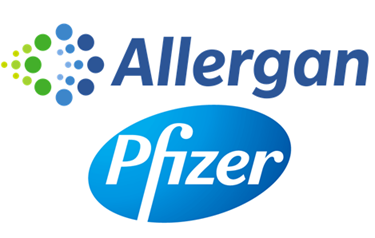Allergan, Pfizer Merge In $160 Billion Tax Inversion Deal
By Jof Enriquez,
Follow me on Twitter @jofenriq

Future of Allergan's medical device business is unclear
In the largest so-called tax inversion deal yet, United States-based Pfizer Inc. is set to merge with Ireland-based Allergan plc in a transaction worth $160 billion, the two companies have announced.
The combined firm would be renamed Pfizer plc and transfer its tax domicile in Ireland, but would make use of Pfizer's global headquarters in New York. For the combined company, the move to Ireland as tax base would significantly slash corporate tax dues from 25 percent to 17-18 percent. The merger is estimated to yield approximately $2 billion in operational synergies over the first three years after closing.
“The combination of Allergan and Pfizer is a highly strategic, value-enhancing transaction that brings together two biopharma powerhouses to change lives for the better,” said Brent Saunders, CEO of Allergan, in a statement. “This bold action is the next chapter in the successful transformation of Allergan allowing us to operate with greater resources at a much bigger scale. Joining forces with Pfizer matches our leading products in seven high growth therapeutic areas and our robust R&D pipeline with Pfizer’s leading innovative and established businesses, vast global footprint and strength in discovery and development research to create a new biopharma leader.”
Saunders will serve as president and COO of the combined company, and Ian Read, Pfizer’s present chairman and CEO, will continue both of those roles with the new company.
Because the combined portfolio of the two companies is expansive, executives of both companies already are considering splitting the combined company into two no later than 2018, according to the statement. It is unclear, however, if Allergan's medical device business will be sold later, as Pfizer plc is largely pharma-oriented. Allergan has been busy bulking up its modest device business recently, having acquired dry eye device developer Oculeve in July, glaucoma device company AqueSys in September, and earFold aesthetic implant maker Northwood Medical Innovation this month. If Allergan's medical device portfolio is retained, Pfizer plc may opt to use the business as leverage to push its drug products.
The mega-merger has rekindled criticism on tax inversion deals being made by an increasing number of American companies. U.S. President Obama previously had described inversions as an "unpatriotic tax loophole" and called on Congress to enact new tax reform laws to discourage such practices that could erode the country's tax base. The U.S. Treasury Department last week introduced new administrative rules that make it more difficult for more American firms to relocate abroad.
However, Pfizer and Allergan have structured their merger agreement in such a way that those new rules have no effect on the transaction, according to the New York Times. Also, the merger is not expected to meet stiff resistance from the regulator tasked to review the deal, the Federal Trade Commission (FTC), according to NYT's sources.
Under the terms of the deal, Allergan shareholders would receive 11.3 shares of the combined company for each existing share, while Pfizer shareholders will get one share of the new company for each of their shares, or a portion of payment in cash from a $6 billion to $12 billion payment that will be made as part of the merger, according to USA Today. After the transaction closes in the second half of 2016, Allergan investors would own 44 percent of the company, while Pfizer shareholders would hold 56 percent.
Medtronic, which closed its own tax inversion deal in a merger with Covidien in January, seems unperturbed by the latest move by the U.S. government to crack down on inversions. According to the Wall Street Journal, the medical device giant said that the Treasury Department’s latest effort to curb the tax benefits of companies moving their headquarters overseas wouldn't “have a material financial impact.”
